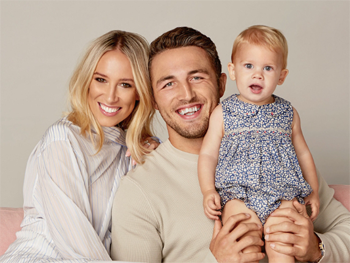Phoebe Burgess Vitamin D Awareness Interview

A Bone to Pick: Millennials Warned to Avoid Vitamin D-etachment For a Stronger Future
Australian health experts have issued a warning for millennials to take a more proactive approach to bone health if they are to stave off musculoskeletal problems in later life. The advice comes as new research revealed more than half (56%) of Australians have never had their vitamin D levels tested, despite a third (32%) of adults aged 18-34 years have been diagnosed with vitamin D insufficiencies.
Commissioned by leading vitamin D brand Ostelin the study showed that despite the high rate of diagnoses, more than a third (34%) of millennials would wait until they fractured a bone before seeking the advice of a GP or medical specialist with a third (36%) saying they couldn't be bothered with the hassle of booking and attending a doctors' appointment.
With more than a quarter (26%) of millennials claiming they have more important health issues to consider, experts are calling for greater awareness amongst younger people around musculoskeletal health and, in particular, the important role vitamin D plays in maintaining strong bones.
Coined D-Apathy, this lack of awareness around vitamin D extends to all age groups with more than one in five Australian adults unable to correctly identify the health benefits of vitamin D. In fact, nearly half (49%) of millennials did not know that vitamin D is essential for calcium absorption and is important for building and maintaining strong bones throughout the whole human life cycle.
Unfortunately, due to the cloud of confusion around vitamin D, over half (51%) of millennial mums are not aware of the importance of vitamin D for bone development in infancy, despite almost two-thirds acknowledging that bone health should be considered from birth.
Sadly, vitamin D awareness appears to remain lacking even as children get older and more active. While almost a quarter 24% of parents said one of their children had broken a bone, fewer than one in five (17%) thought to test for a vitamin D insufficiency as a potential underlying cause.
In response to the research, this year's National Vitamin D Awareness Day is in partnership with Phoebe Burgess – millennial mum to Poppy and wife of NRL star, Sam Burgess – to educate Australians about the important role vitamin D plays at any life stage, but particularly in childhood.
"This research shows that most people living in Australia need to think harder about how to maintain strong bones from an early age," said Phoebe Burgess.
"As a mum, all I want for my child is to be happy and healthy, and this includes laying down good foundations for future bone health such as making sure she's consuming enough calcium, is moving around a lot, and moderately soaking up the sun."
"I'm also an avid user of vitamin D supplementation to ensure my body is absorbing enough calcium every day to maintain and continue building strong bones for life."
National Vitamin D Awareness Day Health Expert and Chair of Exercise and Ageing within the Institute for Physical Activity and Nutrition at Deakin University, Professor Robin Daly, says there is no doubt that there is confusion amongst Australians about the importance of vitamin D in both childhood and later years.
"The requirement for vitamin D begins from the foetal stage, continuing throughout childhood and teenage years," he said.
"Children in particular need vitamin D, which helps calcium absorption, for bone growth and development, as do babies developing in the womb.
Serious vitamin D insufficiency can cause rickets, delayed motor development, muscle weakness, aches and pains, and fractures."
Professor Daly added that the lack of an official RDI for vitamin D could also be a contributing factor to the country's insufficiency.
"A recommended RDI for vitamin D has long been sought but, unfortunately, has not been forthcoming until recently," he said.
Are you at risk of vitamin D insufficiency? Take the D-Test at www.ostelin.com.au. If you are concerned about your bone health or vitamin D levels, please consult your GP.
For more information please visit Ostelin's website, www.ostelin.com.au.
Interview with Phoebe Burgess, Ostelin Vitamin D Day Ambassador
Question: Are you surprised that more than half of Australians have never had their vitamin D levels tested?
Phoebe Burgess: Life is a constant juggle and sometimes there is a cloud of confusion when it comes to our health and wellbeing, so really it's not surprising that more than half of Australians haven't had their vitamin D levels tested. In saying this, it's exactly what we're trying to change! Vitamin D is so essential, particularly for the development and maintenance of healthy bones, so we really need to be proactive and start thinking about it from an early age.
Question: Can you talk about your personal experience with Vitamin D?
Phoebe Burgess: I'm so lucky to have known about the importance of vitamin D during my pregnancy with Poppy so I was able to monitor my levels with the help of my GP. I also make sure I regularly take Poppy outside to play in the sunshine, particularly in these colder winter months, so her little bones can grow into big strong ones! Going into my second pregnancy I'll be doing the same by talking to my doctor and ensuring my little one also has the chance to develop healthy bones.
Question: Why did you decide to become an Ostelin Vitamin D Day Ambassador?
Phoebe Burgess: Being a mother (and soon-to-be mother of two) has made me more aware of how important vitamin D really is, from infancy right through to later in life. When we think of bone health, we generally associate it with older generations, however developing strong bones starts from birth. That's why I'm working with Ostelin to raise awareness of the importance of vitamin D for bone health for all Australians at different life stages. It's never too soon to future proof your health.
Question: What role does vitamin D play in our body?
Phoebe Burgess: Vitamin D is essential for the adsorption of calcium, which helps to form and maintain strong, healthy bones. Without enough vitamin D, bones can become brittle, thin or malformed and can lead to bone fractures, chronic pain and osteoporosis.
During pregnancy, your baby is reliant on all of your stored nutrients so if you have a vitamin D insufficiency, your baby will likely have one too. That's why it's so important to talk to your doctor about vitamin D levels during this time.
Question: How do you personally increase your vitamin D levels?
Phoebe Burgess: I always make sure I spend some time in the sun and exercise every day, however I know that sometimes it's not enough to keep my vitamin D levels at where they need to be. That's why I would encourage everyone to be proactive about your bone health and speak to your GP about whether you may need to take supplements to boost your vitamin D levels.
Question: Have you had Poppy's vitamin D levels checked?
Phoebe Burgess: Since learning about the importance of Vitamin D for her development and growth, I always make sure to have the conversation with my GP every six months or so to make sure there are no indications Poppy has insufficient Vitamin D. We just make sure we stay on top of it!
Question: How should we approach vitamin D levels with our GP?
Phoebe Burgess: It's really just about starting the conversation. If you're heading to the doctor for your regular check-up, ask about vitamin D and think about checking your levels. I would also recommend talking to your GP if you are concerned that your child may be low in vitamin D, as your doctor can then identify any signs of insufficiency.
Interview by Brooke Hunter
MORE



